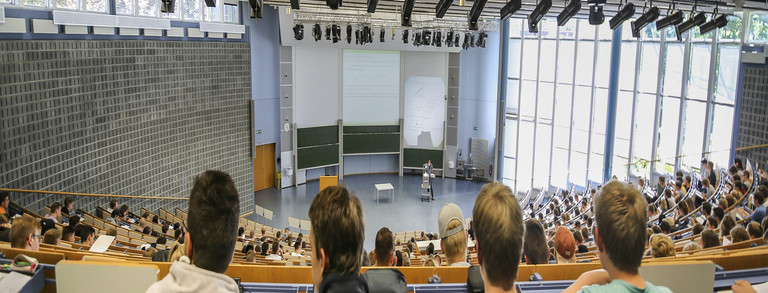Industrial Mathematics
Summary
| Degree | Master of Science (M.Sc.) |
|---|---|
| Subject group | Natural Sciences and Computer Sciences |
| Standard program duration | 4 semesters |
| Admission requirements |
none
|
| Start of studies |
Winter semester
|
| Language | English |
| Enrollment requirements |
Overview enrollment requirements
|
| Further information | Website Industrial Mathematics |
| Department | Department of Mathematics |
Overview
The international Master’s degree program in Industrial Mathematics is an English-language specialization of the Master’s degree program Technomathematics. The combination of pure and in particular applied mathematics (numerics, optimization, scientific computing) together with many computer science components (also from data science) and with applications from natural sciences and engineering in the minor subject represents a very modern and also internationally attractive course of study and is thus very attractive in particular for foreign students.
By integrating practice-oriented study projects and also industrial internships in cooperation with regional industrial companies from the Dortmund area and the Ruhr region, a study program is created that develops a great incentive for foreign (and domestic) students as well as for regional industrial companies and research institutions as potential employers.
Students study as a cohort, attending courses together at the TU Dortmund in the first three semesters. In the fourth semester, students write a master's thesis, which can also be done together with industrial companies. For financial support, students can apply for "Manfred Reimer Scholarships".
Skills and knowledge
The Master’s degree program is designed for students who have a strong interest in mathematical methods and their applications, and who wish to deepen their knowledge in the modern and advanced methods used in this specific area of research and the job market. Except for language skills, the requirements for the Master’s degree program in Technomathematics apply, so that students should bring with their Bachelor’s degree 100 credit points (LP) from mathematical courses and 20 LP from a minor, with a broad basic education in computer science being advantageous. If the amount is less, admission may be granted with conditions (up to 30 LP). In addition, students should have an interest in mathematical applications and a willingness to travel. Due to the international nature of the program, students are expected to have a good command of English (TOEFL with at least 550 (paper-based) / 215 (computer-based) / 79 (internet-based) points).
Field of activity
The Master’s degree program in Industrial Mathematics prepares students for a career in business and industry. Due to its research orientation, it also opens up the possibility of a subsequent doctorate in mathematics or an applied subject. Successful completion of the program demonstrates that students have acquired in-depth specialized knowledge for a transition into professional practice: They are able to apply their mathematical knowledge independently in a wide variety of professional fields in science, technology or business. In doing so, they are also able to recognize and analyze very complex mathematical problems in practice and also generate and implement new scientific approaches to solutions. They have the ability to apply mathematical methods appropriately to solve planning, development and research tasks and can also work as scientific employees at a university or research institution. Students in Industrial Mathematics have additionally acquired deep interdisciplinary knowledge in a natural or engineering science by choosing an application subject in their studies: Overall, they are thus specialists in applied mathematics (numerics, optimization, scientific computing, etc.) who can develop and implement numerical computer simulations in an interdisciplinary environment.
Additional information
In addition to semester-by-semester mobility, students have the opportunity to attend international summer schools during the semester breaks. In addition, the offer of practice-oriented study projects and also internships in cooperation with regional industrial companies from the Dortmund area, the Ruhr region and from all over NRW provides the opportunity to gain experience and make contacts in industrial companies in the high-tech sector already during their studies.




![[Translate to English:] Partner Four hands are holding the green logo of TU Dortmund University](/storages/tu_website/_processed_/1/d/csm_Partner_Nicole_Rechmann_KW_40b35bb3fd.jpg)




![[Translate to English:] Forschung An apparatus with tubes in a laboratory](/storages/tu_website/_processed_/0/c/csm_Forschung_Juergen_Huhn_cbd34afd6d.jpg)
![[Translate to English:] Studium Five students are sitting in a lecture hall. They are talking to each other.](/storages/tu_website/_processed_/c/9/csm_Studium_FelixSchmale_81d94adc86.jpg)





